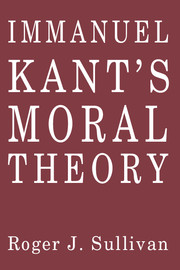Book contents
- Frontmatter
- Contents
- Preface
- Key to abbreviations and translators
- 1 Introduction
- 2 The context for Kant's moral philosophy
- Part I The nature of morality
- 3 The nature of human action
- 4 Prudence: taking care of our own interests
- 5 Morality: living autonomously
- 6 Morally obligatory ends
- 7 The defense of morality
- 8 The primacy of morality
- Part II The moral norm for persons
- Part III The norm for moral judgment
- Part IV Kant on history, politics, and religion
- Appendixes
- Notes
- Bibliography
- Index of names
- Index of subjects
8 - The primacy of morality
Published online by Cambridge University Press: 05 June 2012
- Frontmatter
- Contents
- Preface
- Key to abbreviations and translators
- 1 Introduction
- 2 The context for Kant's moral philosophy
- Part I The nature of morality
- 3 The nature of human action
- 4 Prudence: taking care of our own interests
- 5 Morality: living autonomously
- 6 Morally obligatory ends
- 7 The defense of morality
- 8 The primacy of morality
- Part II The moral norm for persons
- Part III The norm for moral judgment
- Part IV Kant on history, politics, and religion
- Appendixes
- Notes
- Bibliography
- Index of names
- Index of subjects
Summary
Like all previous philosophers within the Greek rationalistic tradition, Kant regarded reason as so transcending the rest of creation that it is uniquely worthy of awe and respect. Reason alone can discern what is true and good; the rest of creation simply is. Reason is the ground of intelligibility, necessity, and universality, and thus also of harmony and peace; by contrast, what Kant called “sensibility” is the ground of surdness, contingency, and particularity, and thus also of conflict.
In his first two Critiques Kant set out to clarify the sources, the reach, and the limitations of the different uses of human reason. (See, e.g., Gr. i–iii/387–88; Pr.R. 120.) He devotes so much care to analyzing the different functions of our reason that it is easy to forget that theoretical and moral reasoning are not different entities. It is the same person, the same rational being, who both thinks and wills: “In the end there can only be one and the same reason, which must be differentiated solely in its application” (Gr. xii/391; see also Pr.R. 8, 89, 91, 121; M.M. 207). In its theoretical use, our reasoning contributes the structure for organizing experience and enables us to have knowledge of the world we experience. That same faculty, in the form of moral or pure practical reason, extends both our agency and our practical insight into the noumenal realm of freedom.
- Type
- Chapter
- Information
- Immanuel Kant's Moral Theory , pp. 95 - 114Publisher: Cambridge University PressPrint publication year: 1989



